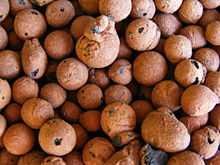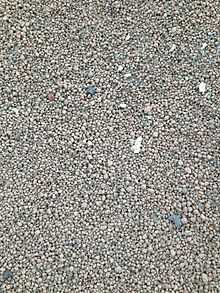Expanded clay aggregate



Expanded clay aggregate is a lightweight ceramic shell with honeycomb core produced by firing natural clay to temperatures of 1100–1200 °C in a rotating kiln. The pellets are rounded in shape and fall from the kiln in a grade of approximately 0–32 mm with an average dry bulk density of approximately 350 kg/m³. The material is sieved into a number of different grades to suit the application.
With the advantage of light weight, high permeability, high durability and excellent sound and thermal insulating properties, expanded clay is a good 'all round' aggregate for use in an a variety of applications. It is also an environmentally friendly product composed mostly of naturally occurring clay, is not susceptible to chemical attack, rot or frost and has a long life span. The lightweight nature of the expanded clay pellet make it an ideal solution when constructing over weak soil deposits or reducing the load behind old and susceptible structure. The air pockets within the pellet provide excellent thermal resistance when used as underfloor insulation within solid floor construction. The expanded clay pellets are also used extensively for the manufacture of Lightweight blocks and frequently used in water filtration systems due to their high surface area.
Uses
Common uses are blocks, slabs, geotechnical fillings, lightweight concrete, water treatment, hydroponics, aquaponics and hydroculture.
See also
References
- Tor Arne, Hammer; Klaas van Breugel, Steinar Helland, Ivar Holand, Magne Maage, Jan P. G. Mijnsbergen, Edda Lilja Sveinsdóttir (2000). Economic Design and Construction with Structural Lightweight Aggregate Concrete. "Materials for Buildings and Structures". Euromat 99. EUROMAT 99 6: 18. doi:10.1002/3527606211.ch3. ISBN 3527301259.
| ||||||||||||||||||||